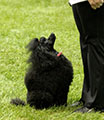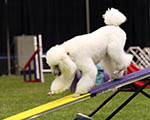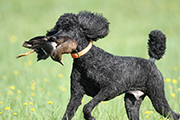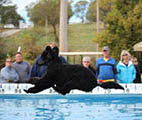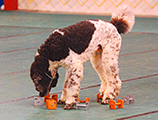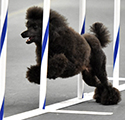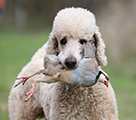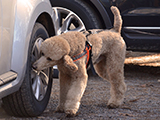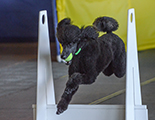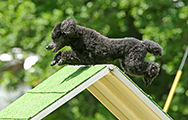Selecting a Poodle Puppy For Field Work
It is my opinion, after evaluating many litters and following them for many years, that the working temperament of a dog is primarily an inherited set of traits. So:
- Pick parents of your prospective puppy for their working traits. These should be inherited traits and NOT trained behaviors. The two most important traits to look for, assuming that they and their parents have passed all of their health tests (see Health Tests Recommended by VIP for Standard, Miniature, and Toy Poodles) and they are people oriented and not man nor dog aggressive, is
- They must be DRIVEN RETRIEVERS. By that I mean they should constantly have a toy, stick, bird, towel, glove, pillow, water dish, or other object in their mouth and be carrying it to you and pushing it into your lap/face. This trait is highly inherited. If your dog is a driven retriever then they are quick to learn and will work all day for the reward of retrieving, no matter what task they are learning or performing.
- They must love the water. If you hope to go any field work then you must have a dog which loves the water and this is very hereditary. Now, if the dog has never been exposed to swimming, they can still show love of water by playing in their water dish, chasing water as it comes out of a hose, playing in the sprinklers, and enjoyment of being bathed.
- Once you have picked the parents of your prospective puppy then you should begin looking at puppies in the litter. At 7 weeks of age you should take each puppy to a place in the house/garden/yard they have not been in before and do aptitude evaluations. A clean garage might be a good place to evaluate puppies. Keep in mind that a puppy who is tired, has a full tummy, or distracted by lots of observers may give a false impression of his aptitude. If you are comparing the puppies in a litter you should try to have similar conditions for testing each one. This may mean that you can only test 3 or 4 on any given day as conditions (temperature, rain, observers, time for naps) can change over 2 or 3 hours making comparisons invalid.
Tests which you can do to evaluate aptitude: (you can probably think of lots more)
- Interest in people:
- Casually walk away from the puppy.
He should follow you happily, no shoelace tug-of-war, no grabbing pant leg and growling, and he should not just stand there where you left him and look bored nor move AWAY from you.
- Noise sensitivity:
- Roll a small plastic container partially filled with BBs or small pebbles away from you and the puppy or past the puppy.
- Fire off a cap gun.
- Drop a metal pan onto the floor unexpectedly.
The puppy should notice the noise, have a slight startle and then investigate. He should NOT show fear.
- Terrain courage:
- Will puppy follow you over a large flattened cardboard box
- Will he chase a retrieve object across a large flattened box (other objects can be a pile of pine needles, a window screen, an exercise pen laying flattened on the floor).
- Will he follow you across a small obstacle such as a ditch, through bushes, or something similar.
- Retrieve instinct:
- Will puppy chase a tennis ball rolled along floor.
- Will puppy chase a tossed retriever bumper.
- Will puppy then pick up object and return with it to you.
- Will puppy chase a shackled or wing-clipped pigeon, then will he bring the bird to you unharmed.
This latter also evaluates the puppy for “hardmouth.” If you suspect that your puppy is too aggressive for the bird you may wish to substitute a bird which is already dead in this test. Please don’t let your puppy torture and maim a bird.
- Perseverance:
If you are pleased with the results from the first 4 types of tests you should test for perseverance. A dog which wants a retrieve object badly enough to continue retrieving a multitude of times at the age of 7 weeks is showing perseverance. This is a dog which has good aptitude for working. A puppy which enthusiastically retrieves the first time, is slightly slower on the second and then won’t retrieve again is showing much less perseverance and will be more difficult to train and to motivate for the work required to compete in the “big event”. A puppy which persists and in fact gets MORE enthusiastic after each retrieve has great aptitude for working.
- Timing:
A puppy should never leave its mother and littermates prior to 7 weeks of age. (guide dog, Fox, Paffenberger, et.al. research studies) Seriously testing a puppy prior to 7 weeks of age is difficult because of their immaturity. You may not see what is there in an immature puppy.
© Dr. Grace Blair. Used with permission.


